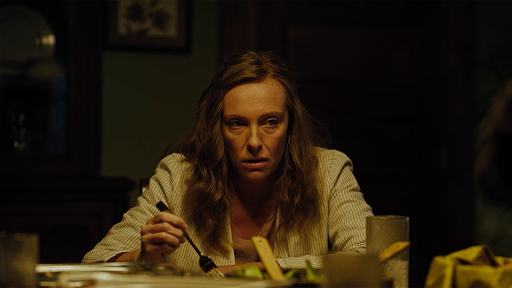Ari Aster and the Horror Genre
Ari Aster’s movies often explore complex themes of grief and familial traumas.

A frame from Ari Aster’s “Hereditary.”
May 11, 2023
Ari Aster started making and directing small short films at the College of Santa Fe in 2010. However, it wouldn’t be until 2018 that he would have his first breakout film under A24 Studios in 2018, “Hereditary.” These films were later followed by “Midsommar” (2019) and “Beau Is Afraid” (2023). All three films were successes with the public, most notably with “Hereditary” becoming a box office smash and A24’s highest grossing film, having made, according to IndieWire, over 82 million on a 10 million dollar budget. All of Aster’s films are of the horror genre, and explore dark, twisted themes of grief, remorse, family trauma, and deterioration of sanity in insane circumstances. The movies, in addition to being hard-core, gut-twisting horror experiences, do not have conventional structures or endings. With magnificent use of colors, cinematography, and brilliant casts, Ari Aster’s movies are more than love letters to the horror genre, but they are reinventing the genre at its core. They are elevating what might have been filled with cheap thrills and chase sequences to a horrifically stunning picture of humanity at its ugliest and the supernatural at its most terrifying.
Although Aster’s three movies vary greatly in both plot and cast, they have similar themes that connect all of them. “Hereditary” is a movie about how grief can infect a family and how families can fall prey to being helpless to escape their trauma and mental illness. The movie, while including a motif for death, is at its core about a family consumed by grief and how that lack of healing can quite literally tear people apart. It also dives into themes of mental illness, using the supernatural effects of the movie as a metaphor for how some people cannot escape what is in their bloodline – what is hereditary. “Midsommar,” similarly, is about the effects of grief on the psyche and the disastrous aftermath following a horrific family tragedy, much like Hereditary. “Beau is Afraid,” however, is more focused on the pain of disastrously high parental expectations mingled with undertones of internalized inferiority for failing to meet said expectations. All three of these movies are about failures of a stable support system and the lack of comfort people are able to draw from those around them when they are in desperate need of it. This makes the movies not only chilling but desperately sad, as the audience is given the front seats to peoples’ devastating unraveling in the midst of impossible circumstances.
These themes mixed with the horror-typical morbid scenes and character developments are what make Ari Aster’s horror movies so effective yet terrifying. In weaving complex, relatable scenarios with the grotesque and unnatural, he is able to create movies that are brilliantly written. Profound, yet understood. This has been a blessing for the horror genre, that in the midst of bloody slashers and half-baked horror comedies Aster hands us three, albeit horrifying, cinematic gems.








